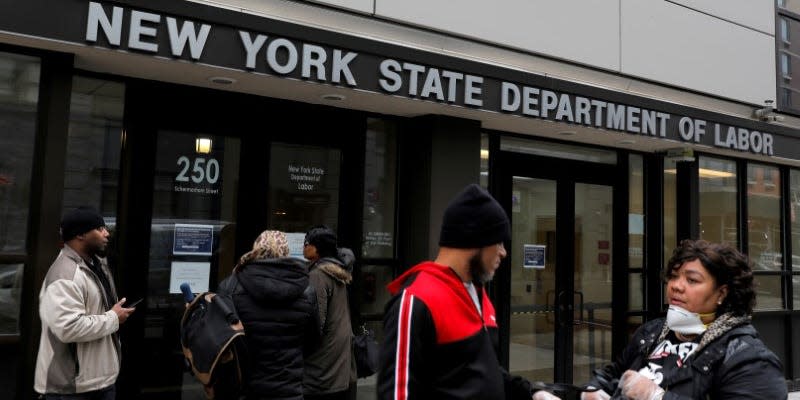Nearly three-quarters of Americans are feeling the financial toll of the coronavirus pandemic

Reuters
Nearly three-quarters of Americans are feeling the pinch financially amid the coronavirus pandemic, according to a new Insider poll.
Various stay-at-home orders, travel restrictions, and COVID-19 outbreaks in the workplace have stalled the US economy. Nearly 17 million people have filed for unemployment in the last three weeks.
Only 25% of poll respondents say they have experienced no financial hardship and have been fairly unaffected by the coronavirus.
The novel coronavirus has swept across the US and flattened millions of American jobs in its wake.
Various stay-at-home orders, closures, travel restrictions, and COVID-19 outbreaks in the workplace have effectively stalled the US economy. Many businesses have closed their doors, with state-mandated lockdowns only allowing "essential" businesses to continue operating unless working from home is possible.
With US companies — from small businesses to major corporations — straining under various lockdown measures, millions of American workers have experienced pay cuts, furloughs, and layoffs.
In the last three weeks alone, nearly 17 million people filed for unemployment in the US.
And according to a new Insider poll, 72% of Americans are feeling some pinch financially due to the pandemic.
On April 10 and 11, we asked 1,017 US adults: "Are you experiencing financial hardship because of the coronavirus?"
11% reported "Serious financial hardship, I'm unsure if I can meet my basic needs this month"
20% reported "Some financial hardship, it's going to be very tight in the immediate future"
21% reported "Slight financial hardship, I'm cutting back on some expenses"
20% reported "Little financial hardship, there's some problems but nothing too out of the ordinary"
25% reported "No financial hardship, I'm so far fairly unaffected by the coronavirus"
The severity of the respondent's financial burden likely is dependent on a myriad of factors, namely the respondent's job, socioeconomic status, and location.
Some people are forced to continue working and risk exposing themselves to infection, because they hold jobs considered part of the critical infrastructure — like grocery clerks, healthcare workers, and delivery drivers. Meanwhile, others are being laid off or furloughed altogether when "nonessential" businesses — like hair salons and restaurants — were forced to close due to lockdown orders.
On the other hand, many white-collar workers have simply been able to move from their corporate offices to their homes, continuing operations remotely.
The unemployment filing in just 3 weeks outpaced the worst month of the Great Recession. In Florida, hundreds of residents were forced to break social distancing measures just to file for unemployment after a website crashed due to the overwhelming volume of online applications.
With so many Americans feeling the financial toll, the federal government approved stimulus checks as part of the $2 trillion stimulus package to hold struggling workers over until the US labor market recovers from the toll of the pandemic.
Despite the US governments' attempts to help struggling Americans make ends meet, many citizens reported that a $1,200 check is simply not enough.
SurveyMonkey Audience polls from a national sample balanced by census data of age and gender. Respondents are incentivized to complete surveys through charitable contributions. Generally speaking, digital polling tends to skew toward people with access to the internet. SurveyMonkey Audience doesn't try to weigh its sample based on race or income. A total of 1,107 respondents were collected April 10-11, 2020, a margin of error plus or minus 3 percentage points with a 95% confidence level.
Read the original article on Business Insider

